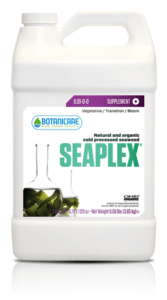By Derex Q. Zellars | Environmental Scientist
Scientific research has confirmed that seaweeds help in increasing yields, drought resistance, frost protection and stress recovery. Although seaweeds contain small amounts of nitrogen, phosphorus and potassium, their value is not as a fertilizer but as growth stimulant.
Seaweeds contain potent concentrations of trace minerals, micronutrients, enzymes, amino acids, sugars, polysaccharides, and vitamins that are essential to plant growth. Most importantly seaweeds contain many naturally occurring growth hormones including: cytokinins, auxins, and gibberellins which stimulate cell division and larger root systems.
Most of the seaweeds extracts you will find on the shelf use a harmful chemical-based, high-heat extraction method that diminishes seaweed’s vital content and produces a substandard product.
Higher performing seaweeds are processed at ambient temperatures, utilize a non-extracted method, consist of the entire seaweed plant, and are fortified with additional nutrients. The result is a creamy seaweed-mineral blend and a superior product with all of the essential ingredients, to help properly nourish plants roots and blooms. This natural process ensures that nutrients are maintained and delivered to the plant. Seaweeds continue to contain maximum levels of all natural growth hormones and preserve all of the natural enzymes, amino acids, vitamins, sugars, and carbohydrates that elicit root growth and fruit development in all types of plants.
For more information on our cold processed seaweed product click here.
Foliar feeding can be used throughout the year and has a variety of benefits throughout the different stages of plant growth and development. Soaking seeds prior to planting has been shown to enhance seed germination by up to 35%. Transplants dipped in a seaweed and water mixture will also produce quicker transplant root development.
Fortifying with additional nutrients will enhance plant nutrient uptake, resulting in stronger growth for new plantings. This combination will also accelerate new growth, helping young plants, such as trees and vines, come into production 25% to 30% earlier than normal. Additionally, the natural growth hormones present in seaweed improve the effectiveness of traditional lawn and garden fertilizers, and other products when used together.
As plants develop the high levels of polysaccharides contained in seaweed, the growth of fruit buds is stimulated, flowering and fruit set is increased from the natural growth hormones that assist as certain plants transition from vegetative growth to reproductive growth and begin developing more fruit or vegetables. Research has shown that seaweed applied at bud development, flowering, and fruit and nut set have increased yields by 6% to 13% and as much as 40% in some cases.
Not only does seaweed help produce more fruit and vegetables, but it can also help increase shelf life an additional two to three weeks. Additionally seaweed applications increase cell wall strength, leading to greater resistance to bruising, softening, and rotting of harvested fruit and vegetables. Applications of seaweeds will depend on one’s watering cycle, stages of plant growth, and size of growing pots.
The advantage of foliar applications allows micronutrients a direct passage across the cell membrane resulting in a more efficient use of fertilizers such as nitrogen, phosphorus and potassium.
